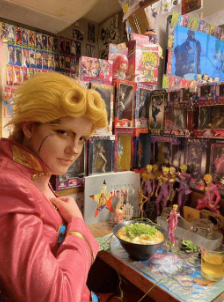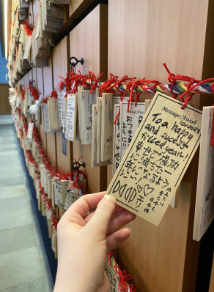First off, let me establish who I am and my expectations being a Diverse Duck abroad. I’ve actually been to Japan many times now—this would be my third or fourth trip—and the last time I went was for an 8 month study abroad program in Osaka (hence why I want to return there, I fell in love with the city.)
I am neurodivergent, and gay, and gender queer, and have anxiety. I typically identify as a woman and am cis but have trouble understanding why a woman has to be a certain thing or be a certain way, I also do drag—where I explore various expressions of gender. Basically, I find gender limiting and illogical, thus I like to explore being ‘handsome’ and ‘like a man’ sometimes too. I’ll try not to wax on for much longer about the intricacies of gender identity. I’m also white, which is important to mention when it comes to Japan.

My experiences thus far in Japan, being all these things that I am, have been generally positive and/or neutral. Unlike the US where these identities can put me in actual physical danger, Japan’s safety is extreme, and is part of the reason that I enjoy being here so much. I’m from Eugene, and as a woman, being able to walk around past sunset in 80% of a giant metropolis city without a flick of fear initiates a feeling of euphoria unknown to me before living in Japan. Very generally speaking, in Japan, even if someone has something bad to say about you, they won’t say it to your face, or they will just ignore you because they’re too busy to care about what you’re doing. Whereas in America it can feel like appearing in public gives everyone a free pass to approach you or make a comment about you, such is not the case in Japan, especially as foreigner, people generally will just leave you alone, which is great! I feel much safer expressing my weird fashion sense, and because most everywhere is so clean I can wear nicer clothes and cuter outfits, which directly ties into feeling more free to express my identities.
Of course, I should talk about the bad side too. Being neurodivergent is really hard anywhere, and there are downsides despite Japan often being called, like, a somewhat autistic country—trains and their robust public transportation being a common autistic hyperfixation, and the emphasis on quiet and clean spaces (i.e. spaces that aren’t as overstimulating) that the US does not have at all being just two examples. However, Japan also has an emphasis on being fast and competent which is hard to describe—my brain can be overstimulated easily, and combined with my anxiety I often don’t process things as quickly as others. It’s not that I can’t understand, but the time it can take me to process what someone just said to me and put it into action can sometimes make Japanese people think I am just stupid in conversation or when I am receiving instructions, in a way that is more strict than the U.S. It’s also a culture that relies on ‘reading the room’ and lack of context especially in the language, which makes communication quite difficult at times for someone who is already working on hard mode. But honestly, it’s not too different from the U.S., where I also run into situations where I feel like I need to read the other person’s mind in order to properly conduct a conversation. In Japan at least I am given some grace for occasionally different approaches to socializing, because I am a foreigner and thus the assumption is that I will never truly understand the intricacies of Japanese culture. There are other things, like being gay or even being mentally ill, which can be much more difficult in Japan—but again this varies. A lot of Japan is ignorant, willfully or otherwise, to queer culture, but most of the young people I met either didn’t care, were supportive, or didn’t have anything negative to say at all while also being pretty uniformed on the intricacies of queer culture. The gender binary is kind of crazily enforced in Japan, despite anime being literally one of my main sources of how I found out I was queer. Japan likes to explore queer themes in media, but in real life, I often felt the pressures of a heteronormative culture, and saw how they affected the Japanese people around me. I occasionally felt not great about not looking like the typical feminine woman, Japanese beauty standards being particularly hard to meet if you don’t want to dress a particular way. I just want to dress like a gay side character in Alice in Wonderland and not be treated like a weirdo, is that too much to ask for? But feeling limited by my gender isn’t just restricted to Japan.
There’s also the thing of race in Japan, and being white, I am privileged to say I never experienced anything negative related to my race. In fact, I received positive comments on my appearance several times, and another white girl on my trip who was particularly conventionally attractive experienced men commenting on how beautiful she was and like… how blue her eyes were. Which uh… was quite strange. I don’t want to speak for the experiences of BIPOC foreigners in Japan that are already well documented, as it’s really not my story to tell, but it must be said that it can be rough, with a lot of Japan being either racist or ignorant or both. People who look very different than a Japanese person are immediately treated very differently in Japan, and things like hair touching without consent or commenting on people’s appearances in a way that any DEI session in the US would inform someone not to is not common knowledge. I will be on an internship in Japan this time around, which will give me the new experience of being in the Japanese workplace. I don’t plan to bring up being gay or doing drag in the workplace unless it comes up or I feel comfortable doing so, more so than I might in the U.S., but of course it depends on the environment. Sometimes it’s quite enjoyable to talk about it with Japanese people, as well as openly talk about my mental health, because as it’s such a taboo subject in Japan that I can meet people who are really interested in discussing it, and it’s interesting hearing their opinions. I do worry about being a woman in the workplace, a bit more severely than in the U.S., just because of how differently I act from most women in Japan. I get tired of trying to be lovely and pleasant all the time, like on every level I cannot perform that certain way, I can also be direct and honest with people in a way that is not perceived as very feminine either here or in the U.S. There’s a lot of levels to this, but I often wonder what it would like to be a man and how differently people would perceive me.
Anyways, wish me luck, I’ll be doing my internship as well as trying to live my life with health and happiness. I’ll update my thoughts here as I go and post another blog soon!

Elizabeth Grieve, GlobalWorks Internship in Kansai
